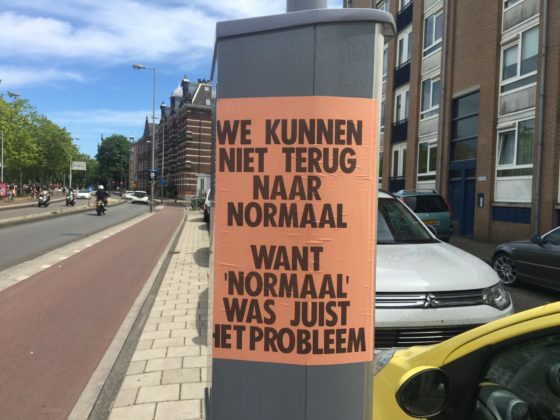Coronavirus in the Netherlands: what you need to know, update June 25


The Dutch government has further relaxed the rules established in March to deal with coronavirus. Here’s an update of what you need to know about how the Netherlands is tackling Covid-19.
Basic hygiene rules remain in force – wash your hands frequently, avoid busy places and stay home if you have symptoms.
If you have symptoms of coronavirus, you should stay home and contact your local health board for a test via 0800-1202.
The 1.5 metre social distancing rule remains the norm for adults, but in places where this is impossible, like on public transport, non-medical face masks should be worn. Find out more about the Dutch position on masks.
Changes to the social distancing rules from July 1
The main changes from July 1:
- The 1.5 metre social distancing rule will no longer apply on public transport – as long as people are seated – but masks will remain compulsory.
- People can also sit next to each other in coaches and non-family groups can travel in the same car. Masks are recommended.
- Outdoor events will no longer have a maximum number of visitors as long as social distancing is observed and people are seated and booked places in advance. Without reservations, the limit is 250.
- Travelling fairs can also start operating again.
- Festivals will depend on local authority licences so it is unlikely these will resume before mid August.
- Indoor events have a limit of 100 people excluding staff. Seating is compulsory. However, if spaces have been reserved in advance, and visitors answer questions about their health, there is no limit on the number of guests.
- Stadiums such as the Kuip and Arena can reopen for events, as long as people keep 1.5 metres distance and do not sing or chant.
- Secondary schools will be able to give traditional lessons, and pupils will no longer have to keep 1.5 metres from each other. However, they should still keep 1.5 metres from teachers.
- Universities and colleges can also restart physical lessons but social distancing will apply. In effect, this is unlikely to happen until the next academic year.
- Cafe terraces can ditch the 1.5 metre rule between tables, if they place protective screens instead.
- Coffee shops, which had been confined to takeaways only, can also function as a cafe again.
- Sex workers can start work again, as long as they keep to protocols.
- Saunas, ports schools and gyms can reopen, and competitive sports can also resume.
- The limit on visits to people in nursing homes is also being lifted.
- However, night clubs and discos remain closed and singing in large groups, including in churches, remains banned because of the risk of infection.
Coronavirus and work
Working from home should remain the norm, but the government will examine possibly changing this position over the summer.
The government has a string of measures to help companies and the self employed deal with the financial fall-out. Find out more about these here. If you are losing your job because of the crisis, check out your rights here.
The government will review the situation ahead of September 1, when clubs and discos should be given the green light to reopen.
Travel and holidays
The Dutch government published a list of 21 European countries where it is safe to go on holiday, including the Dutch number one summer break destination, France but Britain and Sweden remain out of bounds.
‘This is because of the health situation in these countries,’ the ministry said. ‘If you do travel there, you are strongly advised to go into 14 days quarantine at home on your return.’
Greece is not yet on the approved list, because it has not yet given the green light to tourists from the Netherlands, without a period in quarantine. Turkey too remains on the amber warning list.
Travel to outside the EU is still not recommended apart from in an emergency.
Tourists in NL?
The government says people are welcome to visit the Netherlands from other European countries but those from Sweden and the UK should go into self-isolation for 14 days from their arrival. Tourists must also have booked accommodation in advance.
The Netherlands and the other Schengen countries have closed their external borders to people from outside the EU whose journey is not essential until July 1. This is likely to be extended with regard to some countries, but no decision has yet been taken.
Thank you for donating to DutchNews.nl.
We could not provide the Dutch News service, and keep it free of charge, without the generous support of our readers. Your donations allow us to report on issues you tell us matter, and provide you with a summary of the most important Dutch news each day.
Make a donation